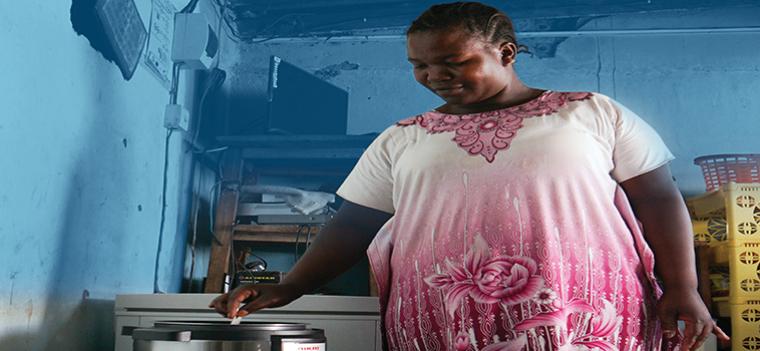News
- The newly published State of Modern Energy Cooking Service report, finds that not progressing beyond the status quo is costing the world more than $2.4 trillion each year, driven by adverse impacts on health, climate, and women’s lost productivity.
- The RBF design of the recently approved first Clean Cooking Fund (CCF) co-financed operation Rwanda Energy Access and Quality Improvement Project has already benefited from the knowledge gained from the study.
- The study will also contribute to the World Bank’s efforts to develop an impact bond market to attract a broad range of funding to the clean cooking sector.
Achieving universal access to clean cooking is a key target of Sustainable Development Goal (SDG) 7, which aims to “ensure access to affordable, reliable, sustainable, and modern energy for all.” However, progress has been slow. According to the 2020 Tracking SDG7 The Energy Progress Report, 2.8 billion people still lack access to clean cooking fuels and technologies, jeopardizing the achievement of SDG 7 and progress across several related SDGs.
Based on the newly published State of Modern Energy Cooking Service report, not progressing beyond the status quo is costing the world more than $2.4 trillion each year, driven by adverse impacts on health ($1.4 trillion), climate ($0.2 trillion), and women ($0.8 trillion from lost productivity). Women and children are disproportionally affected, as they spend the most time in proximity to stoves bearing much of the burden of cooking.
To accelerate access to clean cooking, innovative ways for scaling up investment are needed. The World Bank has used results-based financing (RBF) widely in the health and climate impact sector. Drawing on this experience, the Bank is working to support approaches in which impact-driven funds could be deployed to pay for verified climate, health, and gender impacts from clean cooking interventions. If such capital could be unlocked, it could serve as an innovative way to: (i) attract other funds that target public benefits of climate, health, and gender interventions; (ii) develop the market for clean cooking solutions by catalyzing private investment, innovation, and risk taking; and (iii) over time, mainstream approaches to quantify the benefits of clean cooking into national policies and budgetary allocations. This type of RBF approach can build on recent progress in developing methodologies to measure health, gender, and expanded climate (black carbon) benefits.
In this context, ESMAP’s Clean Cooking Fund (CCF) and the Carbon Initiative for Development (Ci-Dev) jointly initiated a field study on Quantifying and Measuring Climate, Health, and Gender Co-Benefits from Clean Cooking Interventions. The first phase of the study reviewed and assessed the existing methodologies, literature, pilot experience, and relevant measurement tools and metrics. The findings, detailed in the recently published report, Quantifying and Measuring Climate, Health and Gender Co-Benefits from Clean Cooking Interventions: Methodologies Review, confirm that impact-driven funds can be deployed to pay for verified climate, health, and gender impacts from clean cooking interventions.
The report also finds that there are synergies across respective co-benefit methodologies, hence an integrated quantification and measurement approach can be developed. This will help reduce the costs of data collection and verification. By evaluating various existing methodologies using the criteria of cost effectiveness, scalability, replicability, robustness, compatibility, and operational feasibility, the report recommends a set of metrics, tools, and monitoring methods to measure health, gender, and climate impacts using a harmonized approach.
In the second phase of the study the recommended approach is currently being piloted in rural Kenya with an operation to measure how biogas cooking can bring health, gender, and climate co-benefits compared to traditional polluting cooking practices. The data will then be analyzed and findings including lessons learned from the field study will be summarized in a final report.
The study, Quantifying and Measuring Climate, Health and Gender Co-Benefits from Clean Cooking Interventions is being conducted to inform the RBF design of CCF and Ci-Dev co-financed clean cooking operations.The RBF design of the recently approved first CCF co-financed operation Rwanda Energy Access and Quality Improvement Project has already benefited from the knowledge gained from the study. The study will also contribute to the World Bank’s efforts to develop an impact bond market to attract a broad range of funding to the clean cooking sector.
Read more about the methodologies review.
